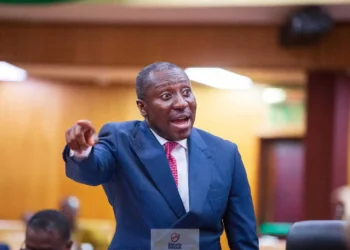President John Dramani Mahama has announced a major environmental policy shift with plans to ban the importation and production of Styrofoam in Ghana, describing the material as one of the “most pernicious pollutants” threatening the country’s environment.
The declaration came during his keynote address at the World Environment Day celebration held at Kwabenya Community Senior High School, where he delivered a passionate call for environmental leadership and responsible stewardship of Ghana’s natural resources.
President Mahama’s speech was marked by urgency and vision. With Styrofoam plastics commonly used as takeaway food packaging across Ghana, the President expressed grave concern about its widespread and irresponsible disposal, which contributes significantly to plastic pollution in cities and waterways
“When you go to buy your food and they put it in that white plastic something, you know, and then you finish eating, you just dump it. That is one of the biggest polluters”.
HE President John Dramani Mahama
Citing its destructive environmental impact and non-biodegradable nature, President Mahama stated that the government, through the Ministry of Environment, would soon outlaw both the production and importation of Styrofoam in Ghana.
He explained that the new policy would encourage the adoption of more environmentally friendly alternatives such as paper-based packaging and aluminium foil for food containers.
“We have to use paper packaging or aluminium foil for packaging our food,” he said, and called on manufacturers and importers to prepare for the impending ban, urging them to begin a transition to sustainable packaging materials.
President Mahama’s commitment to eliminating Styrofoam aligns with a broader environmental agenda that he outlined during his address.

In an impassioned reflection on Ghana’s journey toward environmental sustainability, he invoked the symbolism of moving “from landfills to landmarks” to describe the transformative work required to address waste management and ecological restoration.
A Journey Worth Making
While acknowledging that this transformation will not be easy, he emphasised that it is “a journey worth making.” Laced with subtle humour and a touch of introspection, President Mahama even playfully referenced the familiar presidential phrase “Fellow Ghanaians,” noting its inclusion in his prepared speech with a smile.
However, his message quickly turned resolute as he drew on Ghana’s post-independence history to challenge citizens to rise once more—this time, not against colonialism, but against environmental degradation.
Positioning environmental conservation as both a patriotic and generational responsibility, President Mahama articulated a vision for a Ghana where nature and development coexist.
“As we plant trees and reduce plastic pollution, we honour our ancestors and invest in our descendants. Just as our forebearers rose to the challenge of independence, let us also rise to the challenge of environmental leadership.”
HE President John Dramani Mahama
He continued, “The future is not something we enter; it is something we create for ourselves.” The President’s speech concluded with a stirring appeal to national conscience and collective action.

A Rejuvenated Ghana
He painted a vivid picture of a rejuvenated Ghana: “A Ghana that is green, a Ghana that is resilient and just. A Ghana where our forests thrive, a Ghana where our rivers run clear, and our communities live in harmony with nature.”
President Mahama’s ban on Styrofoam, if successfully implemented, will mark a significant policy win in the country’s environmental efforts.
Environmental activists and civil society organisations have long advocated for stricter regulation of single-use plastics, citing their adverse effects on both land and marine ecosystems.
The move also places Ghana in line with several African nations, such as Rwanda and Kenya, that have adopted bold plastic bans as part of their national sustainability strategies.

Nonetheless, President Mahama’s proposed measures will require strong political will, effective public education, and enforcement mechanisms to ensure compliance, especially in a country where plastic packaging is deeply embedded in everyday consumer practices.
Stakeholders in the food packaging and plastics manufacturing industry may resist the transition, but the government’s announcement signals a firm policy direction.
READ ALSO: Bulls Roar Back! GSE Sees Sweeping Gains After Shaky Start






















